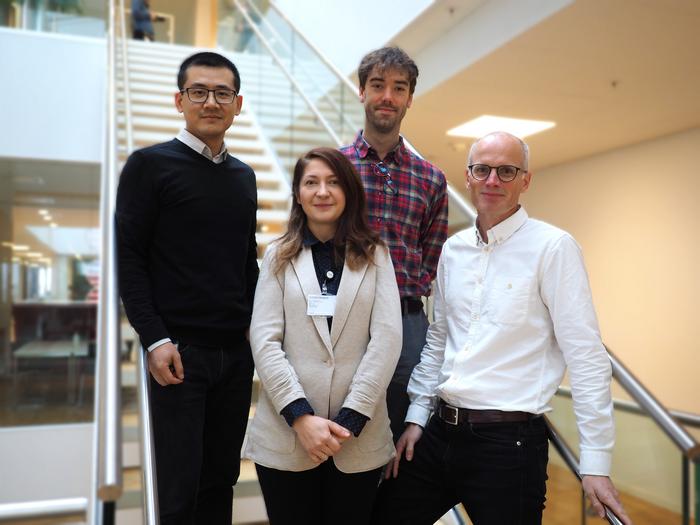Production of biological substances for medicine using genetically engineered yeast cells shows new promising results in basic research from an international team of researchers. In 2022, the researchers attracted international attention by programming the longest-ever biosynthetic pathway – or ‘assembly line’ – into a microbial cell factory and designing it to produce biological substances for cancer drugs.

Credit: Photo: Lea Gram Hansen.
Production of biological substances for medicine using genetically engineered yeast cells shows new promising results in basic research from an international team of researchers. In 2022, the researchers attracted international attention by programming the longest-ever biosynthetic pathway – or ‘assembly line’ – into a microbial cell factory and designing it to produce biological substances for cancer drugs.
In an article published in the scientific journal Nature Chemical Biology, Biosynthesis of natural and halogenated plant monoterpene indole alkaloids in yeast, the researchers now present results with the artificial production of the naturally occurring substance, alstonine, which has shown promising results for use in treating mental disorders.
“Development of medicines from natural plant substances is widely used. However, since plants do not produce these substances to fight human diseases, there is often a need to modify them to make them more effective and safe,” says Michael Krogh Jensen, a senior researcher at DTU Biosustain and co-founder of the biotech company Biomia.
The researchers hope that the yeast platform can play a prominent role in discovering and developing plant-based medicine.
Fewer side effects for patients
The new research results prove that the engineered yeast cells can make other substances in the group of alkaloids than the substance vinblastine, for which the researchers presented results in 2022. In addition to producing the two new natural plant substances, alstonine and serpentine, the researchers have further developed the method to make 19 new derived variants of the two substances through a chemical process called halogenation, often used in medicine development. Today, up to 40 percent of the substances tested in human trials are produced by halogenation.
“We have found a method to make yeast cells use enzymes and carry out the same chemical process that takes place in halogenation. Plants generally can’t naturally carry out halogenation. Therefore, our versatile biotechnological platform is a possible method for optimizing and developing plant-based alkaloids that may then be used to make medicines against, for example, schizophrenia, for which there are many negative side effects such as insomnia, weight gain and reduced immunity, when using existing medicines” says Michael Krogh Jensen.
The researchers created the yeast-based cell factories by inserting a large number of genes from plants that can generate biosynthesis of natural plant substances. In addition, they inserted enzymes from bacteria to halogenate these natural substances and tested the production in yeast. Following the conversion into serpentine and alstonine, the substances were purified. The researchers then tested their structure – using an NMR analysis (Nuclear Magnetic Resonance spectroscopy), which looks at the composition of atoms – and investigated their bioactivity in a cell line from monkeys.
Tested in human trials
The researchers have filed a patent application for the manufacture of the chemistry involved and established the company Biomia, which has a license to the patent portfolio that protects the manufacturing method. For drug discovery within part of the chemistry that the researchers presented in their Nature article from 2022 and this new study, Biomia raised 3 million USD in September 2023.
The research into the new yeast-based production of the halogenated plant-inspired natural substances and the 19 variants is still in an early phase, where the researchers are now finding the best candidates to use in treating mental disorders. The candidates must then be prepared for testing in clinical studies. At best, Michael Krogh Jensen expects to be able to send substances derived from alstonine to clinical trials in 2026.
Even if the clinical studies show promising results against schizophrenia or other mental disorders, it will still be at least ten years before the research may lead to new medicines for purchase at pharmacies.
Journal
Nature Chemical Biology
DOI
10.1038/s41589-023-01430-2
Article Title
Biosynthesis of natural and halogenated plant monoterpene indole alkaloids in yeast
Article Publication Date
6-Nov-2023
COI Statement
J.D.K., J.Z., L.G.H., S.A.B. and M.K.J. are inventors on pending patent applications (patent applicant: Technical University of Denmark; application number: PCT/EP2023/063481). L.G.H., J.Z., J.D.K. and M.K.J. have financial interests in Biomia. J.D.K. also has financial interests in Amyris, Lygos, Demetrix, Napigen, Apertor Pharmaceuticals, Maple Bio, Ansa Biotechnologies, Berkeley Yeast and Zero Acre Farms. All other authors have no competing interests.




